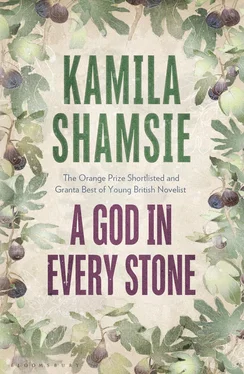When Qayyum started to ride away on his bicycle he could hear the calls of the departing boys — Alif Bey Pay! The Pashto alphabet a song which they carried across the orchards to their homes where literacy had never before crossed the doorway.
Spring had come to the Peshawar Valley, and there was nothing in the world that wasn’t possible. Qayyum rode through a world in bloom, slowing to check the progress of the sugar cane and the plum blossoms, though he had walked among them just a few hours earlier with Kalam’s father as he did every morning on his way to the schoolhouse. From orchards to gardens to city walls to the Street of Storytellers — he pedalled through the heart of the Peshawar Valley, feeling it pulse all around him, gathering its potential. Something new was coming, he was part of it. He watched a regiment marching past and there was pity in him for the Indian soldiers who didn’t understand the disquiet in their own breasts.
Near the Street of Courtesans his bicycle wheel wobbled, but just in time he heard Najeeb calling out to him from across the road and, dismounting, went to meet his brother.
— Were you about to go into that alley, Lala?
— Of course not.
— Have you ever been in there?
— Keep asking questions like that and I’ll send you back to the mullah.
Najeeb grinned at that, and butted Qayyum’s shoulder with his head. Their mother’s insistence on accompanying Najeeb to the mosque had lasted less than a week. The trick of it, Qayyum had explained to his brother, was simply to tell her everything he’d learned from the mullah that day as she walked him home. She never exactly said he should stop going, but one day she said he should go without her, and the next day she sent him to the market to buy vegetables and when he said he couldn’t do that and be at his lessons at the same time she shrugged and said, potatoes come to us from heaven, and it was understood. So it was Qayyum now who took over his brother’s religious instruction, teaching him as he taught the boys at school — Islam teaches us goodness, teaches us virtue, teaches us service, teaches us brotherhood, teaches us gentleness. But we are Pactyike, the most warlike of the Indians, Najeeb replied, indignant. That most unwarlike boy ever to be born into a Pashtun family. It was impossible not to laugh.
— Where are you coming from? The Museum?
— Yes. Lala, in my holidays will you take me to Shahbaz Garhi?
— Of course. I’m glad you’re finally interested in seeing the Yusufzai lands.
— It’s a great archaeological site. The Rock Edicts of Asoka.
Qayyum laughed, threw his hands up in a gesture of defeat. Every day more English words in Najeeb’s Hindko — Classics, archaeological site, excavation, scholarship, university. Even their mother knew there was nothing to do but accept it. How do you pull the wings off a bird in flight? she’d asked Qayyum after Najeeb had sent her to the Museum on its women-only day and chattered away to her for hours after she’d returned, explaining what it was she’d seen there.
Home now, and he climbed the steps behind Najeeb towards the sounds of his mother and her eldest granddaughter, a sparkling-eyed girl of four. They were sitting at the long table as he entered, his mother holding a doll in her hand and his niece kneeling on a chair, elbows on the table, looking at the open pages of one of Najeeb’s books.
— Do you want to learn how to read?
Najeeb sat down beside her as he spoke, both of them small enough to occupy a single chair. The child nodded her head, placed her hand on the page and said, Alif, Bey, Pay. Qayyum lifted her up in his arms, away from the book, away from Najeeb’s questioning gaze, and placed her on her grandmother’s lap.
— Play with your doll, little one.
Pulling the blanket close about his shoulders, Najeeb settled himself onto the rope-bed beneath a small-leafed tree on the Street of Storytellers, and respectfully greeted Ashfaq Lala. In return, the Storyteller gestured to an attending boy who approached with a blue enamel cup which the sun patterned with leaf-shapes as it passed into Najeeb’s hands. Najeeb ducked his head in thanks, raising the mug to his face to take in the scent of kahwa as the Storyteller leaned forward on his raised platform, and began the badala:
Listen to my story, but first add sugar to your tea,
There are salty tears aplenty here but no sweetness, you’ll see.
It’s a story of Darius, the King of over-there,
King of Kings, King of all things, King of over here.
One morning he awakes — where there should be wife, there’s parchment,
Queen Atossa thus transformed! Is this hell- or heaven-sent?
The night before she lay beside him, flesh and blood and breath,
This morning she’s papyrus, the length of his bed.
What happened here, you ask? Be patient, I’m the Storyteller.
Her ink as warm as blood, her skin oiled. What demons dwell here?
The King reads down the length of her, his lips near her skin.
How long since Atossa was so smooth, so pliant, so thin.
But when he stops reading, the King of Kings he weeps,
The Queen watches, nodding, from the alcove of the Keep.
It wasn’t her at all, of course — you believe such silly things.
She left this parchment here for him, for Darius, King of Kings.
He weeps for what Scylax has written. Scylax the Trusted One.
His words rip the King’s heart like twenty bullets from a gun.
How could the man who wore his circlet write these words of praise
Not of Darius and the Persians but of that Carian slave!
Where do you place your loyalty, my good Peshawari men,
If you wrote of heroes today whose deeds would move your pen?
Najeeb nodded approvingly — Ashfaq Lala was telling it better than ever before. The idea for this badala had occurred to him a few weeks ago when he was flipping through The Encyclopaedia of Antiquity in the Native Assistant’s office at the Museum, and found an entry on Scylax with this intriguing line: The lost biography of Heraclides of Mylasa has also been attributed to Scylax . He had turned to the entry on Heraclides and found that he was a Carian prince who had ambushed Darius’ forces and routed them in bloody battle . Why would anyone think Scylax the Trusted One had written a biography of such a man? He had closed the encyclopaedia, leaned back in the chair, and thought, but Qayyum would like the story — the man who served the Empire turning to the service of his people. What would Miss Spencer make of it, though? The thought brought with it a stab of sorrow. He had tried to go back to see her, wearing his sister’s burqa so no one could report him to his mother, but her house was empty. Perhaps one day when he was older and the world was different she’d return and he could bring them both here together — Miss Spencer and Qayyum. They’d sit on either side of him and laugh and cry together at the story of Scylax, as interpreted by Najeeb Gul, the Herodotus of Peshawar.
Droplets of mist attached themselves like burs to Viv’s sleeves as she walked away from St Dunstan’s Hostel for blind servicemen, and diagonally across the park towards the lamplit facade of Cambridge Terrace. All her life she had looked down from her second-storey bedroom to this piece of darkness, and yet the first time she had walked home from St Dunstan’s past sunset, through the clawed shadows of trees, it had felt unknown to a greater degree than anything in Labraunda or Peshawar. Now, just a few weeks later, she barely gave it a thought.
She hadn’t dreamed returning to London would feel so much like freedom. How it changed the character of a city, the landscape of it, to have so many women in places they’d never been seen before — far more than when she had left. Today if a woman archaeologist were to suggest going to Cairo to work on maps no one would laugh. Gertrude Bell had joined Lawrence at the Arab Bureau, and it was whispered that Margaret Hasluck was with Intelligence too. The possibilities for Viv’s life were so overwhelming she decided to resume VAD duties for a short time until she made up her mind about what else to do. It was the news of nursing shortages at St Dunstan’s across the park which led to that decision. It wasn’t a Class A hospital, and it was close enough to home to allow her to avoid hostel living. Convenience, rather than duty, guided her. But from her first day at St Dunstan’s, service — a word which had never carried much weight in her life — revealed itself as privilege. Nothing in her life had ever made her feel more useful than placing a blind man’s hand on Braille and watching his face as the shapes became letters for the first time. And if sometimes the slow pace of a Braille-learner’s progress made her think wistfully of Najeeb, the thought was accompanied by only a dull pain now. He was receding. Even Tahsin Bey was receding. She hadn’t written to him once since arriving in London. What was the point if the letters didn’t get through to him?
Читать дальше












